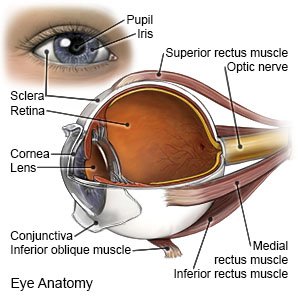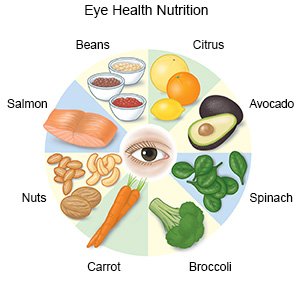Dry Eye Syndrome
Medically reviewed by Drugs.com. Last updated on May 6, 2024.
What do I need to know about dry eye syndrome?
Dry eye syndrome happens when the eye has trouble keeping moisture. Dry eye syndrome may also be called dry eye disease or keratoconjunctivitis sicca (KCS).
 |
What causes dry eye syndrome?
- A lack of tear production
- Tears that cannot moisturize the eye or that leave the eye too quickly
- Dry or windy environments that cause tears to evaporate
- Conditions that decrease the amount of tears the eye glands make
- Eye diseases that cause inflammation of the surface of the eye or eye glands
- Chemical or thermal burns of the eye
What increases my risk for dry eye syndrome?
- Age 50 or older
- Pregnancy or menopause
- Medical conditions such as Sjögren's syndrome, hyperthyroidism, or graft-vs-host disease
- Eye surgery such as LASIK, cataract surgery, or cosmetic surgery to lift the eyelids
- Certain medicines, such as Parkinson disease medicine, hormone replacement therapy, or blood pressure medicine
- Wearing contact lenses
- Long periods of time looking at electronic screens, such as a computer, tablet, or smart phone
What are the signs and symptoms of dry eye syndrome?
- Stinging, burning, or itching in one or both eyes
- Red or watery eyes
- Eye pain when you look at light
- Feeling like something is in your eye
- Blurry eyesight or loss of vision
- Not being able to cry or make tears when you are sad or upset
How is dry eye syndrome diagnosed?
Tell your healthcare provider about your symptoms and any medicines that you take. Your provider will use a microscope to examine your eyes for swelling or injury. Your provider will also look for problems with the glands that make tears. Your provider may measure the amount of moisture in your eyes with a tiny test strip.
How is dry eye syndrome treated?
Your provider may change the type of contact lenses that you wear. You may need to stop wearing your contact lenses. Your provider may stop or change medicine that is causing your dry eyes. You may also need any of the following:
- Medicine may be given to decrease pain or swelling, or treat an eye infection. You may also need medicine to increase the amount of tears your eye makes. These medicines will be given as eyedrops.
- Lacrimal plugs can be placed into your lacrimal gland. Your lacrimal gland is where tears drain from your eyes to your nose. Plugs prevent tears from leaving your eyes. This may also prevent dry eye.
- Serum drops help heal the surface of the eye. You may need platelet rich plasma (E-PRP) or plasma rich in growth factors (PGRF). Your provider can give you more information about serum drops.
- Procedures may be used to help improve symptoms. Heat is applied along your lashes to open meibomian glands. These glands produce oil that helps keep tears on the eye's surface. Light therapy may help if inflammation is causing your symptoms or making them worse. The light destroys certain blood vessels to reduce the inflammation.
- Surgery may be needed if other treatments do not work. Surgery can be done to permanently close your lacrimal glands. This will prevent tears from leaving your eyes. This may also prevent dry eye.
Treatment options
The following list of medications are related to or used in the treatment of this condition.
What can I do to manage or prevent dry eye syndrome?
- Use artificial tears, gels, and lubricating ointments as directed. They are available without a doctor's order. These products can replace tears and help add moisture to your eyes. Ask your provider how often to use these products.
- Apply a warm compress to your eyelids as directed. Use a soft washcloth soaked in warm water. Leave the compress on your eyelids for 5 minutes. Gently massage your eyelids after you remove the compress. These actions may help open your meibomian glands.
- Wear glasses or sunglasses. These should cover the sides of your eyes and fit close to your face. These will protect your eyes from dry air. They may also help keep moisture in your eyes.
- Rest your eyes from electronic screens. Wear blue-blocking computer glasses, or use an anti-glare screen cover. Take breaks. Look at an object 20 feet away from the screen every 20 minutes. Do this for 20 seconds before you look back at your screen. This can prevent blurry vision, headaches, and tired eyes. Rest your eyes for 15 minutes every 2 hours.
- Use a humidifier in your home. A humidifier may help keep moisture in the air and prevent dry eyes.
- Eat foods that contain eye-healthy nutrients. Eye-healthy nutrients include vitamin A, vitamin C, vitamin E, omega-3 fatty acids, lutein, and zeaxanthin. Examples of foods that contain these nutrients include spinach, peanuts, salmon, collard greens, avocados, squash, eggs, and blueberries. Ask your healthcare provider for a full list of foods that contain eye-healthy nutrients. You may also need to take a vitamin or supplement to help you get enough of these nutrients.

- Do not smoke. Nicotine and other chemicals in cigarettes and cigars can make dry eye syndrome worse. Ask your provider for information if you currently smoke and need help to quit. E-cigarettes or smokeless tobacco still contain nicotine. Talk to your provider before you use these products.
When should I call my doctor?
- Your dry eyes do not get better with treatment or get worse.
- You have thick, yellow drainage from one or both eyes.
- Your eyelids or skin around your eyes is red and swollen.
- You have changes in your vision.
- You have questions or concerns about your condition or care.
Care Agreement
You have the right to help plan your care. Learn about your health condition and how it may be treated. Discuss treatment options with your healthcare providers to decide what care you want to receive. You always have the right to refuse treatment. The above information is an educational aid only. It is not intended as medical advice for individual conditions or treatments. Talk to your doctor, nurse or pharmacist before following any medical regimen to see if it is safe and effective for you.© Copyright Merative 2024 Information is for End User's use only and may not be sold, redistributed or otherwise used for commercial purposes.
Learn more about Dry Eye Syndrome
Treatment options
Symptoms and treatments
Medicine.com guides (external)
Further information
Always consult your healthcare provider to ensure the information displayed on this page applies to your personal circumstances.
